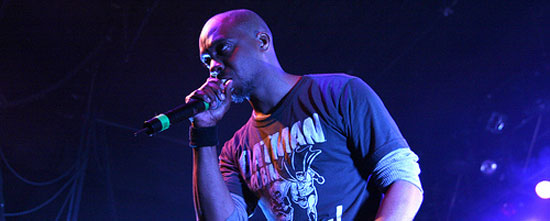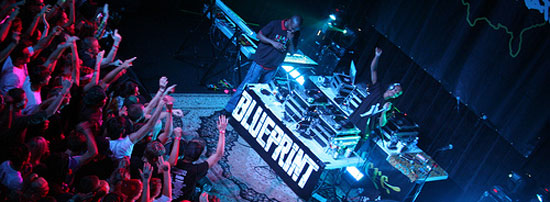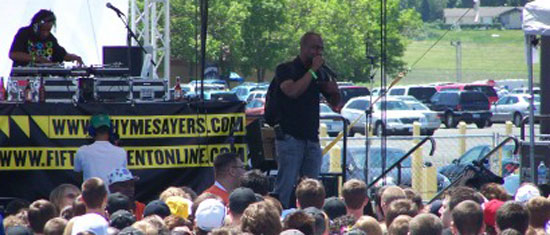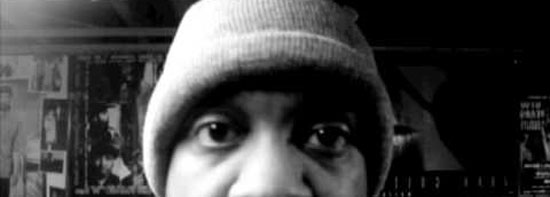Blueprint Talks Shop on the DIY Music Business
Posted by Justin Boland on Aug 26, 2010 | 0 Comments

Blueprint is a dope human being and I’m honored he took the time to do this interview. That’s not just blogger ass-kissing, though: I’ve been thinking about the business behind hip hop for years now and Blueprint (along with El-P and Heiroglyphics) was an early inspiration for going the DIY route. So, as Blueprint preps for his upcoming tour with Atmosphere, I got a chance to talk shop about the business of hip hop.
This interview is powerful science. Take notes and shit.
Justin Boland: What does an average week look like for you in 2010? Is your time mostly occupied with music itself, or music business?
Blueprint: Early in the year, maybe around the first quarter, most of my time was spent just trying to finish up music; my solo album Adventures in Counter-Culture and the second Greenhouse ep. But after that it kind of switched to more of the business side of things, and things related to just putting out music in a better way and building infrastructure, if you will. For example, one of our goals for Weightless was to change our site over to wordpress and also to redesign our webstore. For a lot of bigger labels that might have been a quick outsourcing job but for us we don’t have that luxury. I have a couple people who help out, but nobody is full-time, and everybody pretty much does it because they support our vision — not because they wanna get paid. We have to be very careful about where we spend our money at, and being like that just means you take more time to get things done…but I don’t mind it.
I think this year has been the year that I’ve spent more time trying to be proactive about my web presence, simply because i view it as one of the most important pieces for an artist. So this year I’ve spent a ton of time trying to build up my own website printmatic.net and learn the ins and outs of blogging, video-blogging and stuff like that. Anything I learn I try to apply to the label. I’ve tried to look at it more like something that has to be in place when my album comes out, as opposed to something that has to be in place and work immediately.
When you’re studying up on running a website, video blogging, etc…who do you trust? What models do you look to, are there any teachers you’d recommend?
Blueprint: This may sound weird but a lot of what I’ve learned about blogging and running a website isn't really from hip-hop websites, it’s from reading Mixed Martial Arts and Personal Finance blogs. The ones I read the most frequently are bloodyelbow.com and getrichslowly.org. I was into them just because of the content at first, but when I really looked at them from a technical standpoint I was amazed at how well done everything is—from the content itself to the presentation, to how they create an environment that cultivates interaction. The biggest thing I’ve learned about websites and blogging is how important it is to have interaction. Any artist can get on their blog and pour their heart out about whatever pops in their mind, but I think the artists that can engage readers to interact will ultimately win. I know a lot of artists may not want to hear this but the artist-fan relationship is a two way street. Even though it’s the internet and a good amount of people consider it impersonal and not real, humans still want to interact.
Some e-books that I would suggest are “New Music Strategies: The 20 Things You Must Know about Music Online” by Andrew Dubber, “Musician 2.0” by Peter Spellman, and “The Art of Community” by Jono Bacon. If I remember correctly all of them are free. I’m also currently reading a couple books by Chris Anderson, Free and The Long Tail
.
You put in a ton of work helping to build and support the hip hop scene in Columbus, OH. What advice do you have for artists who are trying to get something started in a city that doesn’t already have a scene of it’s own? What are the key ingredients, to you?
Blueprint: The first piece of advice I would say is to not be easily discouraged and to expect resistance. Prior to 7 or 8 years ago there were venues in Columbus that never would’ve given a weekend date to hip-hop and most of them wouldn’t have booked it at all. Same thing with retail and press — nobody was touching it. Then slowly but surely they all started to come around after a few artists knocked down the door.
The second piece of advice i would give is to be as active as possible. I’ve been fortunate to be a person that wore many hats; artist, producer, show promoter, and label owner — so I always had something to be involved with in the music community. If you’re not a part of you’re local music scene it’s going to be almost impossible to be successful, so get involved. I would also advise artists to not just limit themselves to playing shows with all hip-hop line-ups all the time. The goal is to play in front of a good crowd who’s receptive to what you do, and depending on what you do that might not necessarily mean the hip-hop crowd. You never know, so its always good to play shows outside of your comfort zone.
What’s changed about how you make an album in 2010 vs. 1999? What are the most important planning lessons you'd have for first-timers?
Blueprint: I’m not completely sure anything has changed about making an actual album nowadays. You’ve still got to spend as much time as possible putting it together and trying to be as unique and as ambitious as possible. But what I do think has changed is that the cycle of introducing an album to the public seems to have gotten a little bit longer. Sometimes it feels like there needs to be a lot more setup before an artist puts out a full-length in todays climate. Back in 1999 the guys lucky enough to put out 12” singles were putting out out singles, and then the album later. We couldn’t really afford that so we went straight to the album. Nowadays it seems like an artist dropping an album without at least putting out an ep or a mixtape first is unheard of. It’s a little different but I think it may actually be good because you have to build your brand before you put out anything, whereas before you could kind of come out of nowhere, but in doing that you might not have the longevity.
In the past year, I’ve been surprised to find out that even though the “Vinyl Comeback” is getting a lot of press…it turns out most of the sales are in genres other than hip hop. What has your own experience been with pressing (and selling) albums on vinyl?
Blueprint:The last time I did a real tour was 2008 with Atmosphere and from what I could see vinyl was definitely coming back. I was going thru quantities of vinyl on that tour that I’ve never sold in previous years. I think it’s because kids don’t necessarily buy it to listen to it anymore; I routinely see kids buy records on vinyl that they’ve already downloaded or own on CD. They go home and hang the vinyl on their walls. I guess things are changing but people still want something to represent that music, or to have something physical to go along with it. The main issue with vinyl right now is that unlike CD pressing the cost hasn’t really gone down over the years. It shouldn’t cost the same to press 1000 pieces of vinyl right now than it did 15 years ago, but it does. That in itself is a big problem for a lot of artists. I think the demand is definitely there, but the high cost of it is still a problem that’s gonna make a lot of artists and labels pass on it. But even so I still feel more excited about vinyl than CDs right now.

Has there been any major changes in how you book shows in the last 5 years, or is the world of gigs still pretty much the same?
Blueprint: Fortunately, not much has changed about booking shows. It's the one area that seems to have experienced very little changes. The only change I see is that you have to plan out your shows more in advance than usual because with so many artists making less from record sales, touring is now one of the most reliable sources of income. Acts that would have never hit the road 7 or 8 years ago are now trying to tour, so you’ve got to be a little more strategic that usual with your planning.
Do you have any veteran advice for surviving tours?
Blueprint: Do I ever! The first piece of advice I would give would be to never bring anybody extra with you. Anybody that goes with you should have a function like driver or DJ or something like that — not just be your homie who thinks touring is the same as vacation. Touring is not vacation, you’re there to do a job, so bringing people who think it’s just a chance to travel or kick it leads to nothing but trouble. Everybody isn’t built for the road.
Another piece of advice I would give would be to look at touring as if there’s three stages:
* the losing-money-but-getting-exposure stage
* the making-money-but-only-breaking-even stage
* and the making-money stage.
It’s very rare for any act to jump to that third stage right out the gate so you should be prepared to spend a good amount of time in the first two stages of touring. Go out there with the sole purpose of picking up new fans. Not to chase women, or to travel, or to get drunk every night. If you’re not committed to making new fans then you might as well stay at home. Otherwise, you’ll get discouraged very easily. Touring is easy if you’re disciplined about it, but if you’re not organized and disciplined about it then it will take you under fast.



